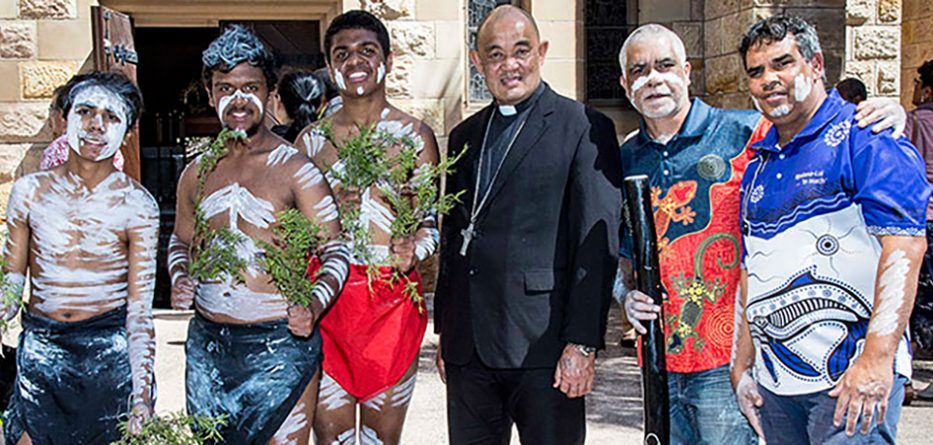A leader of the bishops of Oceania has given Brisbane Catholics a personal account of the climate threat engulfing Pacific island nations.
Oceania Federation of Catholic Bishops’ Conferences president Archbishop Peter Loy Chong spoke of the crisis in a homily at midday Mass in St Stephen’s Cathedral last Sunday.
He was a guest of the archdiocese for the launch of the 2019 Season of Creation, an ecumenical celebration held annually from September 1 to October 4, the feast of St Francis of Assisi.
It was also a re-launch by the archdiocese’s Living Laudato Si’ steering committee of Pope Francis’ 2015 encyclical Laudato Si’ (On Care for Our Common Home).
Heading to higher ground
The Archbishop of Suva, Fiji, told the congregation of how rising sea levels were forcing Fijians to head to higher ground.
Archbishop Chong, whose father is a Chinese immigrant to Fiji and mother a native Fiji woman, said when his grandfather’s house close to the sea was burnt to the ground 14 years ago he chose to rebuild on higher ground.
“Today, 14 years later, most of the houses have moved away from the shore and they’ve moved up (on to higher ground),” he said.
“They could see, after many years of living close to the shoreline, the sea was moving up.”
Archbishop Chong said Kiribati was another Pacific island nation being forced to adjust to rising seas.
“The World Bank says that in 2050, some of those islands (of Kiribati) will be 50 per cent under water …,” he said.
“The Government of Kiribati has bought a big piece of land, probably about 100 acres (40ha) of land in Fiji for relocation of people from Kiribati.”
Archbishop Chong said it would mean not just leaving their land but also their culture as they faced the challenge of “melding” with the Fijian culture.
Chinese government exports harmful
Another environmental disaster he described was how 10 years ago the Chinese government had established a large stone quarry near his mother’s village.
“They were extracting stones from the river to crush the stone (for export),” he said.
“… This is important because the quarry took away the stones and left all the mud.”
Without the rocks, floods or strong currents in the river then washed away all the soil to the sea.
The soil covered the coral reefs and the mangroves, “damaging the ecosystem”.
“And now when the people go to fish they cannot catch any fish because the breeding ground of the fish has been destroyed and they have moved away,” Archbishop Chong said.
“So these things are very important for the ecology and ecosystem but also for human survival …”
He said these stories were common experiences in small-island nations of natural disaster and disasters caused by companies that exploited the environment.
Caring for our common home
He said Pope Francis, in Laudato Si’, taught that “the root cause of the ecological crisis is what he calls the techno-economic paradigm and our misguided way of looking at where human beings are in this world”.
“The Pope says that in this techno-economic paradigm he is referring to how technology and money have power over creation and also the way we think,” he said.
“And he says that through the combination of technology and economic power human beings have the power to change, use, manipulate creation, and every time people see something unique … their mind goes into this paradigm – ‘How can we use this so that it will serve the interests or the self-interest of humankind?’
“Every time, through the eyes of this techno-economic paradigm, when people look at creation, look at the fields, look at what’s under the sea, all they see is ‘How can we change it? … so it becomes marketable?’, ‘How it can satisfy the self-interest of human beings?’
“Pope Francis tells us that this is what causes the ecological crisis.
“The techno-economic paradigm unfortunately does not see life as a web of inter-connectedness.
“We have lost our relationship, an inter-relatedness with Creation and with other people.”
That was part of the ecological conversion called for in Laudato Si’
“We need an ecology with God at the centre,” Archbishop Chong said.
Brisbane Archbishop Mark Coleridge celebrated the Mass and Auxiliary Bishop Ken Howell, who chairs the Living Laudato Si’ steering committee, concelebrated along with Archbishop Chong and Spiritan Father Gaspar Mushi, a Fijian priest from Pine Rivers parish.
Members of the Fijian Catholic community, some of whom knew Archbishop Chong, were at the Mass and joined him for a picnic and traditional dancing and singing in the cathedral grounds afterwards.
By Peter Bugden. Republished with permission from The Catholic Leader and the Archdiocese of Brisbane.








